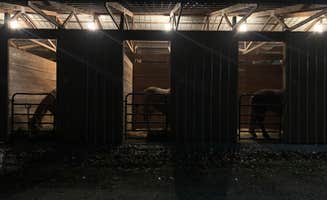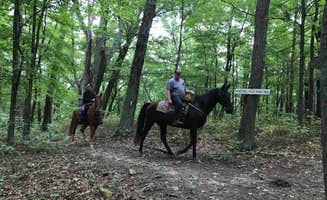Equestrian camping in the greater Clarksville area offers riders access to trails through diverse Ohio landscapes. The region sits within the Little Miami River watershed at approximately 900 feet elevation, with mixed deciduous forests and rolling terrain. Fall temperatures typically range from 40-70°F, while summer months can reach the 90s with moderate humidity, creating a variable climate for horse camping throughout the season.
What to Do
Trail riding at Hueston Woods: The park offers access to bridle paths that wind through one of Ohio's few remaining old-growth forests. "There is a marina nearby where you can rent a John boat for pretty cheap too," notes Renée C., making it possible to combine riding with fishing during your stay at Cowan Lake State Park Campground.
Horseback riding at Five Rivers: Dayton Metro Parks maintains dedicated equestrian trails with varied terrain. "This was a lovely backpacking trail that is both challenging while not being too hard for new backpackers," shares Kenpocentaur K. about the Five Rivers Metroparks system, where some trails accommodate both horses and hikers.
Horse-friendly water activities: Many parks allow horses access to designated water areas. At Pike Lake, "The lake is smaller, but nice beach area and pedal boats are fun. We hiked the Greenbriar and CCC Trails. They are not too challenging but beautiful," reports Leon H., though riders should check specific horse access points.
What Campers Like
Dedicated equestrian camping loops: Horse owners appreciate separate camping sections designed specifically for equestrian needs. At Winton Woods Campground, "There are 123 campsites including RV sites, tent pads, and camping cabins," according to Nancy W., with some areas more suitable for larger rigs with horses.
Horse-friendly amenities: Several campgrounds provide water access points for horses. "The nice thing about their site is the additional tables made it easy for us to socially distance," notes Kenpocentaur K. about Twin Creek Metro Park, which offers more space than standard campsites – beneficial for those camping with horses.
Proximity to trail systems: Riders value direct trail access from campsites. At Buck Creek State Park Campground, "Nice place to spend the night" according to Tarah W., with trails connecting directly to camping areas, reducing the need for loading and trailering between rides.
What You Should Know
Reservation requirements: Horse camping sites fill quickly during peak seasons. "Get your ideal site early during busy season," advises Kenneth D. about Winton Woods, a rule that applies especially to equestrian sites throughout the region.
Site approach challenges: Some equestrian areas have difficult terrain for larger horse trailers. At A.J. Jolly Park & Campground, "Overnighted here with my horses on my way south for the winter, but will definitely be coming back and spending more time. Stall accommodations are excellent, even include bedding," shares Judy B., though the approach to some sites requires careful navigation.
Weather considerations: Drainage issues affect some campgrounds after heavy rain. At Pike Lake, "It rained quite a bit and many of the sites got flooded. The ground here doesn't drain well," warns Bob M., something horse owners should consider when planning stays.
Tips for Camping with Families
Beginner-friendly horse experiences: Several parks offer guided rides for younger visitors. "The campground is nice but it's an extremely long walking distance to the lake," mentions Karen J. about East Fork State Park Campground, where families can split activities between riding and water recreation.
Kid-friendly horse campgrounds: Look for equestrian sites with nearby playgrounds. "There are playgrounds in several loops (I saw them in C and G)," notes Lee D. about East Fork State Park, providing options for children when not engaged with horses.
Educational opportunities: Some parks offer nature programs focused on horses and local wildlife. "The park also had a lending library and walking stick lending program. I thought these were simple but memorable features," explains Kenpocentaur K., highlighting additional activities for children at various parks.
Tips from RVers
Equestrian site sizing: Most horse-friendly sites accommodate trailers up to 30 feet, but capacity varies by park. "Site Quality: All camper pads are paved and most appeared level or just very slightly sloped," reports Lee D. about East Fork State Park, though equestrian sites often have different specifications.
Hookup limitations: Horse camping areas sometimes offer fewer amenities than standard RV sites. "When we reserved months earlier, we knew that our first night (a Saturday) was 100% full as we got the very last site," shares Lee D., highlighting the importance of understanding available facilities.
Shared facilities distance: In some parks, equestrian campers must travel to reach shower houses or dump stations. "Bath/Shower House: Not all loops have their own bath house," mentions Lee D., a consideration for those camping with horses who may be located in specialized loops.



